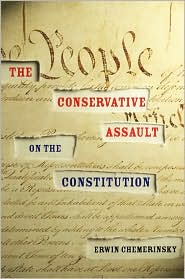Last year (in one of my first blog posts) I compared the covers of two prominent constitutional law books–Randy Barnett’s Restoring the Lost Constitution, and Balkin, Siegel, et al Constitution in 2020. Randy was kind enough to provide a link to that post.
Today, I would like to compare the cover of Barnett’s book with Erwin Chemerinsky’s new book, The Conservative Assault on the Constitution.


Any similarities? Well both covers cut out pieces of the Constitution. In order to dissect (no pun intended) the constitutional philosophies of each author, and which cover is better, I will analyze which portions the authors cut out of the Constitution.
Barnett’s book omits these provisions:
- “do ordain and establish”
- “Section I”
- “Legislative Powers herein granted shall”
- “House of”
- “in each state”
- “No Person”
- “representative who”
- “Inhabitant of that”
- “Representatives and direct”
- “Numbers shall be determined”
- “not taxed, three fifths of all other Persons. The actual enumeration”
- “happen in the Representation”
- “Representatives shall chuse”
Chemerinsky’s book omits these provisions:
- Part of “We” in “We the People”
- “and establish this”
- “legislative Powers herein granted shall”
- “Qualifications requisite for electors of the”
- “a Representative who shall not have”
- “The actual enumeration shall be made within”
- “Term of ten years, in such manner as”
So what can we conclude?
Let’s focus on their areas of disagreement. Both Barnett and Chemerinsky seek to excise the following provisions from the Constitution:
- “ordain and establish”
- “legislative Powers herein granted shall”
The preamble doesn’t really have any meaning anymore, so that’s out. By both omitting the phrase “legislative Powers herein granted” from Articel I, I suppose their only area of agreement is that Article I should not include any limitation on Congress’s powers, and that they should be able to do anything they want. I’m glad Barnett cleared that up. I thought he was in favor of a strict understanding of enumerated powers, or something like that. I score that round a wash.
However, Barnett cuts out the 3/5 clause, which is good. Chemerinsky leaves it in, which is bad. So Barnett wins that round.
Final result:
Applying a Presumption of Constitutionality, Chemerinsky wins. Barnett cuts out more provisions. Because the Constitution is good, and cutting stuff out is bad, Chemerinsky wins.
However, applying a Presumption of Liberty, Barnett Wins. Barnett cuts out portions of the Constitution to illustrate the fact that the Supreme Court has ignored some of our most fundamental liberties. Chemerinsky cuts out portions of the Constitution simply to write his name and the title of the book. Much less poignant. He could have just written over a Constitution blurred in the background like some other progressive Constitutional law books, but I suppose he was trying to make a point.
Because I’m not sure which way Footnote Four cuts here, I’ll call it a tie.